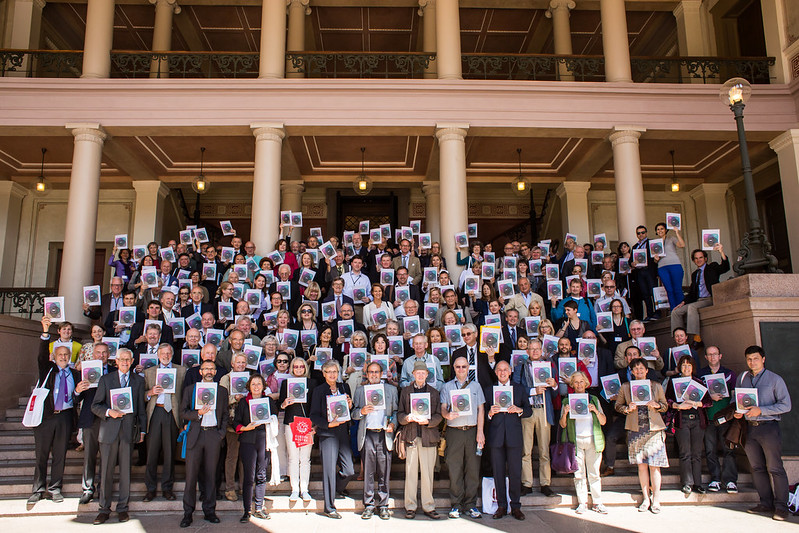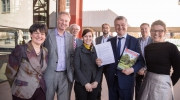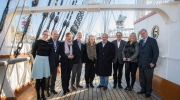European project results demonstrate cultural heritage does count for Europe’s sustainable development
Oslo, 12 June 2015 – Europa Nostra and the partners of the EU-funded project ‘Cultural Heritage Counts for Europe’ (CHCFE) have revealed today the main findings and strategic recommendations for tapping into heritage’s full potential by providing compelling evidence of the value of cultural heritage and its impact on Europe’s economy, culture, society and the environment. Key findings show how adopting a holistic approach is an added value when measuring the impact of cultural heritage on employment, identity, regional attractiveness, creativity and innovation, economic contribution, climate change, quality of life, education and lifelong learning, and social cohesion. The CHCFE key findings will be further discussed at the European Parliament on 16 September, and the CHCFE Book will be presented to the public on 22 October at a networking evening kindly hosted by Bertelsmann.

In the report’s Executive Summary and Strategic Recommendations, the CHCFE Steering Committee calls for the elaboration of specific “heritage indicators” to facilitate and improve the collection of cultural statistics which are key to support policy makers in evidence-based policy making; for the holistic impact assessment to be conducted as a requirement in all EU-funded heritage projects to better measure impact and monitor trends over a longer period of time. The Steering Committee also asks EU Institutions and its Member States at all levels of governance to integrate the care, protection and proper use of heritage in all related policies, programmes and actions and to include all stakeholders and civil society in developing strategies and policies for cultural heritage. Last but not least, it calls for the recognition of heritage’s positive contribution to regional and local sustainable development in the context of the mid-term review of the Structural Funds (in 2016-2017) and the preparation for the next generation of Structural Funds beyond 2020.
“All available evidence confirms that heritage is a strategic resource for a sustainable Europe. We need to enhance our policy action at all levels. It is time to develop a truly integrated approach to heritage, maximising the impact of heritage policies on the local economy and society. This is one of my priorities,” said Tibor Navracsics, European Commissioner for Education, Culture, Youth and Sport speaking at the launch of the CHCFE’s final report.
In addition to the key findings and strategic recommendations, the nearly 300-page report provides a snapshot in time of the currently available and accessible data within EU Members States on the wide-ranging impacts of cultural heritage in Europe. The report’s publication release builds on the momentum of policy makers recognizing the potential of Europe’s cultural heritage, most recently with the 6th Conference of Ministers responsible for Heritage organised under the Belgian Chairmanship of the Council of Europe (April 2015), but also the Horizon 2020 Expert Group on Cultural Heritage report Getting Cultural Heritage to Work (April 2015), the Conclusions on Participatory Governance of Cultural Heritage (November 2014) the Communication Towards on Integrated Approach to Cultural Heritage for Europe (July 2014), and the Conclusions on Cultural Heritage as a Strategic Resource for a Sustainable Europe (May 2014).
“The CHCFE consortium began this project to address the absence of readily accessible data on cultural heritage and of a comprehensive overview of its value and relevance on the European level which is so crucial for sound policy making. We are all pleased to see the enhanced interest which cultural heritage has generated at the EU and international level and truly hope that important body of work will contribute to strengthening the dialogue between civil society and decision makers with a view to realising the full potential of cultural heritage as a strategic resource for Europe’s future sustainable development,” states Sneška Quaedvlieg-Mihailović, Secretary General of Europa Nostra, on behalf of the CHCFE Steering Committee.
The project’s findings and final report were revealed at the CHCFE concluding conference held today at the University of Oslo and organised in conjunction with the Europa Nostra’s Annual Congress 2015. Keynote speakers including Commissioner Navracsics, European Commissioner for Education, Culture, Youth and Sport, Ingvild Stub, State Secretary of the Norwegian Ministry of Foreign Affairs, and Maxime Prévot, Vice-President and Minister of Wallonia’s Government. CHCFE project partners and heritage experts were also invited to present results and implications for evidence-based policy making in Europe to an audience of cultural heritage professionals, academics, researchers, and distinguished European political figures.
Background
The EU-funded project Cultural Heritage Counts for Europe (CHCfE) was launched in 2013 with an ambitious goal: to collect and analyse existing and accessible evidence-based research and case studies regarding the economic, social, cultural, and environmental impacts of cultural heritage, in order to assess the value of cultural heritage. The project also aimed to provide conclusive evidence -both qualitative and quantitative – which would demonstrate that cultural heritage makes a key contribution to the Europe 2020, A European Strategy for Smart, Sustainable and Inclusive Growth.
The two-year project, supported by the EU Culture Programme (2007-2013), was launched in July 2013 by a consortium of six partners – Europa Nostra (acting as project coordinator), ENCATC (the European Network on Cultural Management and Cultural Policy Education), Heritage Europe (the European Association of Historic Towns and Regions), the International Cultural Centre (Krakow, Poland) and the Raymond Lemaire International Centre for Conservation at the University of Leuven (Belgium) – acting as partners, as well as The Heritage Alliance (England, UK) as associate partner.
Joana Pinheiro
Europa Nostra Communications Officer
jp@europanostra.org
+31 63 43 65 985
Elizabeth Darley
ENCATC Communications Officer
e.darley@encatc.org
+32 2 201 29 12






